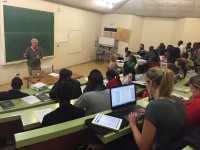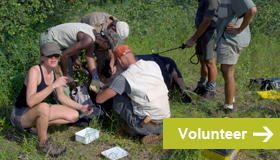Capacity building
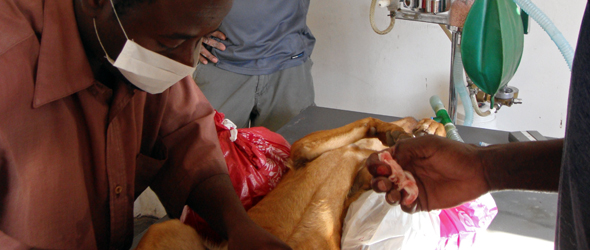
The Trust firmly believes that the way forward for conservation on a national scale is to have competent, salaried local capacity able to deal with a broad range of wildlife and domestic animal situations.
Latest updates
U.K.'s Equine specialist Tim Greet Lectures Fifth Year Veterinary Students at UZ
The AWARE/SPANA alliance ran an equine training course for fourth and fifth year veterinary students at the University of Zimbabwe in November 2015, involving both lectures and practical sessions. The main speaker was Dr Tim Greet of Rossdales Equine Veterinary Hospital in Newmarket, Cambridge, UK, (the largest equine veterinary hospital in Europe). We, and the students, were very privileged to benefit from his knowledge, as he has recently been awarded the Veterinary Achievement Award in the UK for his contribution to advancing equine surgery during his career. Other speakers included SPANA veterinary director Dr Francesca Compostella, Dr Erick Mutizhe, Dr Andy Garura, Dr Desman Chingoma and Dr Mark Lombard. Our thanks to the Dr Davies Pfukenyi, Dean, and Dr Murondoti, Chairman of the Clinical Department of Veterinary Science who collaborated with Dr Keith Dutlow to organise this successful course.
AWARE/SPANA alliance opens student Clinical Skills Centre at UZ Veterinary Faculty
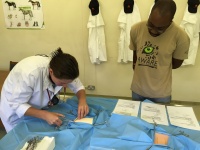
In alignment with both organisations' capacity building objectives, SPANA has funded a Clinical Skills Laboratory where UZ clinical veterinary students can come and practise basic skills such as drawing blood (from a dummy), processing blood and dung samples, gloving up for surgeries, suturing, bandaging fake equine legs, and watch informative DVDs at their convenience. The lab is manned by Dr Erick or Dr Andy when they are not on their ambulatory donkey clinic routes. This is essential to give students the confidence to learn a skill before they apply it to a live animal.
AWARE/SPANA alliance holds donkey CPD Course for Zimbabwean Vets
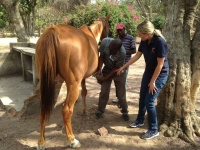
SPANA/AWARE held a fully funded donkey veterinary training course for 29 government vets, University of Zimbabwe vets and vets from VAWZ in October 2014. Visiting equine surgeon and Veterinary Advisor to SPANA’s Zimbabwe programme, Dr Francesca Compostella teamed up with Erick and Andy to give a two day course in approaches to commonly encountered veterinary problems in donkeys. This will equip government vets to administer practical solutions in the field, effectively increasing the area covered by AWARE. A practical session was held (albeit on horses) at the Lion and Cheetah Park. Dr Fran was quick to remind everyone though that a donkey is not just a small horse!
AWARE, UZ and WVU hold inaugural wildlife course at UZ in August 2013
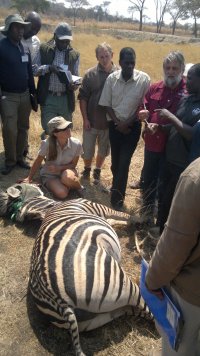 There has been a growing feeling in the veterinary profession that the right to use game capture drugs - the world's most dangerous drugs - in Zimbabwe should be reserved for veterinarians who possess the necessary understanding of physiology and pharmacology to administer the drugs safely. There is also an over-production of vets in the country who often end up seeking work in another profession because veterinary jobs are scarce. With lay people allowed to use these drugs after a two week course, there is no incentive to hire a vet to treat wild animals. Past wildlife courses have generally been outside the financial reach of local veterinarians whose salaries are not high. With this in mind AWARE collaborated with Dr Norman Mukarati of the University of Zimbabwe and Dr Columbus Chaitezvi of the Wildlife Veterinary Unit to produce a very affordable, top quality wildlife course strictly for veterinarians only.
There has been a growing feeling in the veterinary profession that the right to use game capture drugs - the world's most dangerous drugs - in Zimbabwe should be reserved for veterinarians who possess the necessary understanding of physiology and pharmacology to administer the drugs safely. There is also an over-production of vets in the country who often end up seeking work in another profession because veterinary jobs are scarce. With lay people allowed to use these drugs after a two week course, there is no incentive to hire a vet to treat wild animals. Past wildlife courses have generally been outside the financial reach of local veterinarians whose salaries are not high. With this in mind AWARE collaborated with Dr Norman Mukarati of the University of Zimbabwe and Dr Columbus Chaitezvi of the Wildlife Veterinary Unit to produce a very affordable, top quality wildlife course strictly for veterinarians only.
AWARE facilitated top lecturers leading the course, which included the highly esteemed South African wildlife veterinarians Dr Roy Bengis and Dr Cobus Raath, who have 70 years of experience in the Kruger Park area of South Africa between them. The course was attended by 22 local and regional vets and included practical sessions at the Lion and Cheetah Park and Mazowe College. It encompassed common wildlife diseases and one health issues; animal welfare and legislative issues pertaining to wildlife handling, keeping and managing; and physical & chemical handling of wildlife. The latter section is run by Dr Cobus Raath, who runs his own accredited courses in South Africa, and it instructs in the chemical and physical restraint of wildlife in general and at an individual species level.
We hope to make this an annual event. The next course is open to final year veterinary students as well as vets and is scheduled for 18-24 August 2014, at a cost of $750.00.
Keith and Lisa attend the 2013 Malilangwe Drugs Course
As a requirement for the continued licence to use Dangerous Drugs in Zimbabwe, all vets and Dangerous Drugs Licence holders have to attend a course in the immobilisation of wildlife every 5 years. Up until 2013 the Malilangwe Course was the only course available. Keith and Lisa attended the February 2013 Malilangwe Course before their involvement in the UZ Course that was held later in the year.
Dr Erick Mutizhe attends the 2011 Malilangwe Dangerous Drugs Course
Dr Erick Mutizhe attended the 2011 Malilangwe Dangerous Drugs Course, which has allowed him the right to acquire, possess and use the dangerous drugs that are necessary for game capture. Since then, alongside his donkey work, Erick has received alot of on-the-job wildlife training, and has been sent on a number of solo wildlife missions. Erick was even filmed by Discovery Channel darting lions at Antelope Park on the TV series 'Roaring with Pride'.
AWARE starts anti-poaching training for rangers in Parks
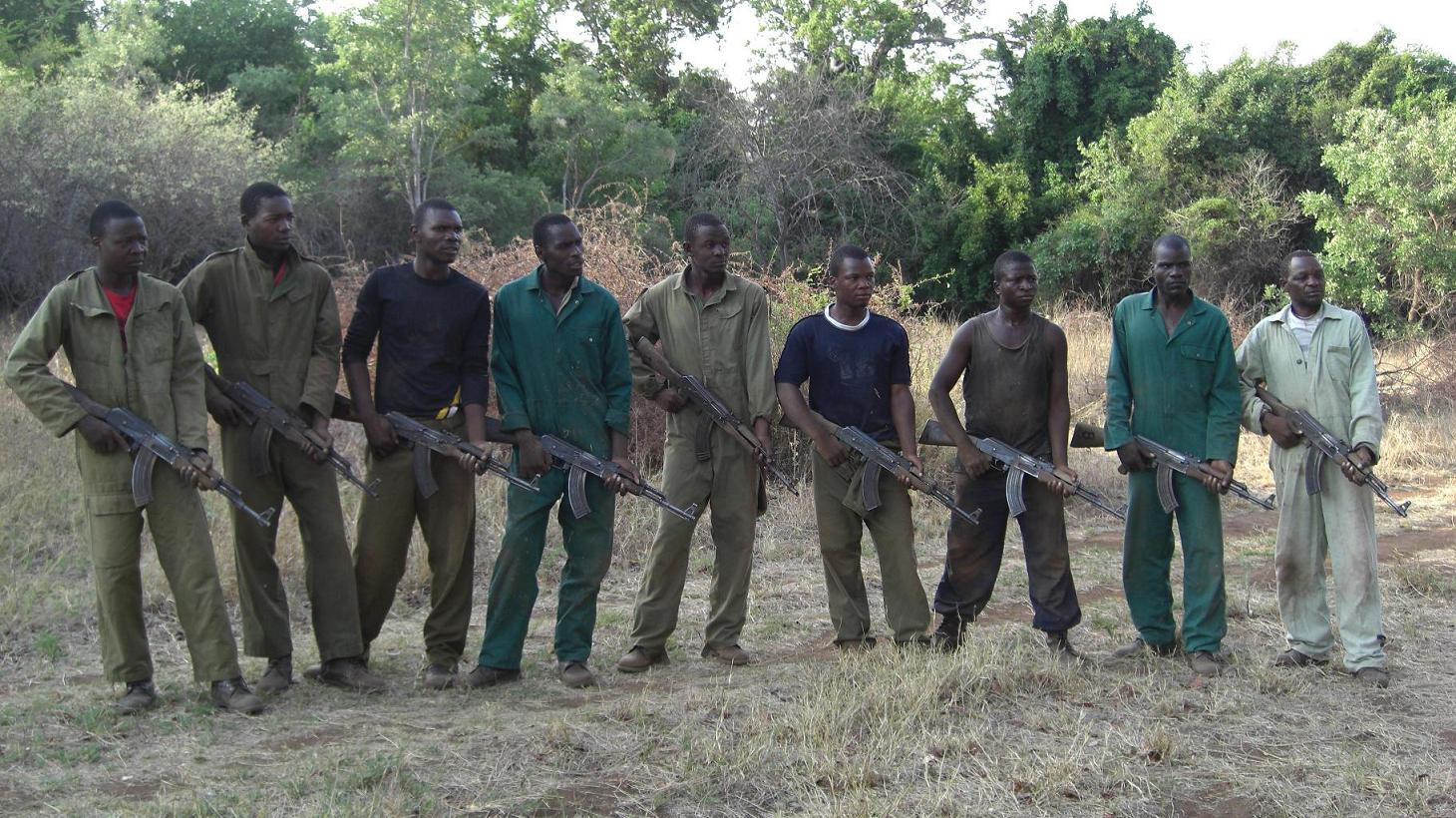
In a new and very exciting development in 2010, PWMA granted permission for AWARE to conduct a series of Tracking and Anti-Poaching Training Courses for National Parks rangers in Chipinge National Park led by ex military Grade A Tracking Instructor Pete Clemence, and his son Bryce. The Basic Course, held in August, was a three-week long selection course designed to provide the basics of tracking, weapon handling, ‘contact’ training, map-work, and GPS use. Talented individuals were identified to proceed to the Intermediate Course, held in November. Graduates from this will proceed to the Advanced Course in 2011 with the objective being to finally establish an ‘elite’ unit capable of eliminating the threat of armed poachers. The importance of this training cannot be overstated. These rangers are expected to put their lives on the line every day to defend rhino against armed poachers. Due to a lack of resources within PWMA, they go on extended patrols with very limited equipment, in some cases little training, and at the end of the day for comparatively little reward. These courses provide the confidence for them to tackle any situation, and the interest being taken in them is a powerful motivator. In December AWARE facilitated a Ranger Training Workshop for PWMA trainers to standardise the ranger curriculum at a national level. The workshop was very encouraging and we look forward to assisting the PWMA training programme in 2011, with further courses to be run by Pete and Bryce in Parks all over the country. If anyone is interested in corporate sponsorship of this activity, please contact us.
SPANA's Dr Karen Reed gives Donkey Medicine Course
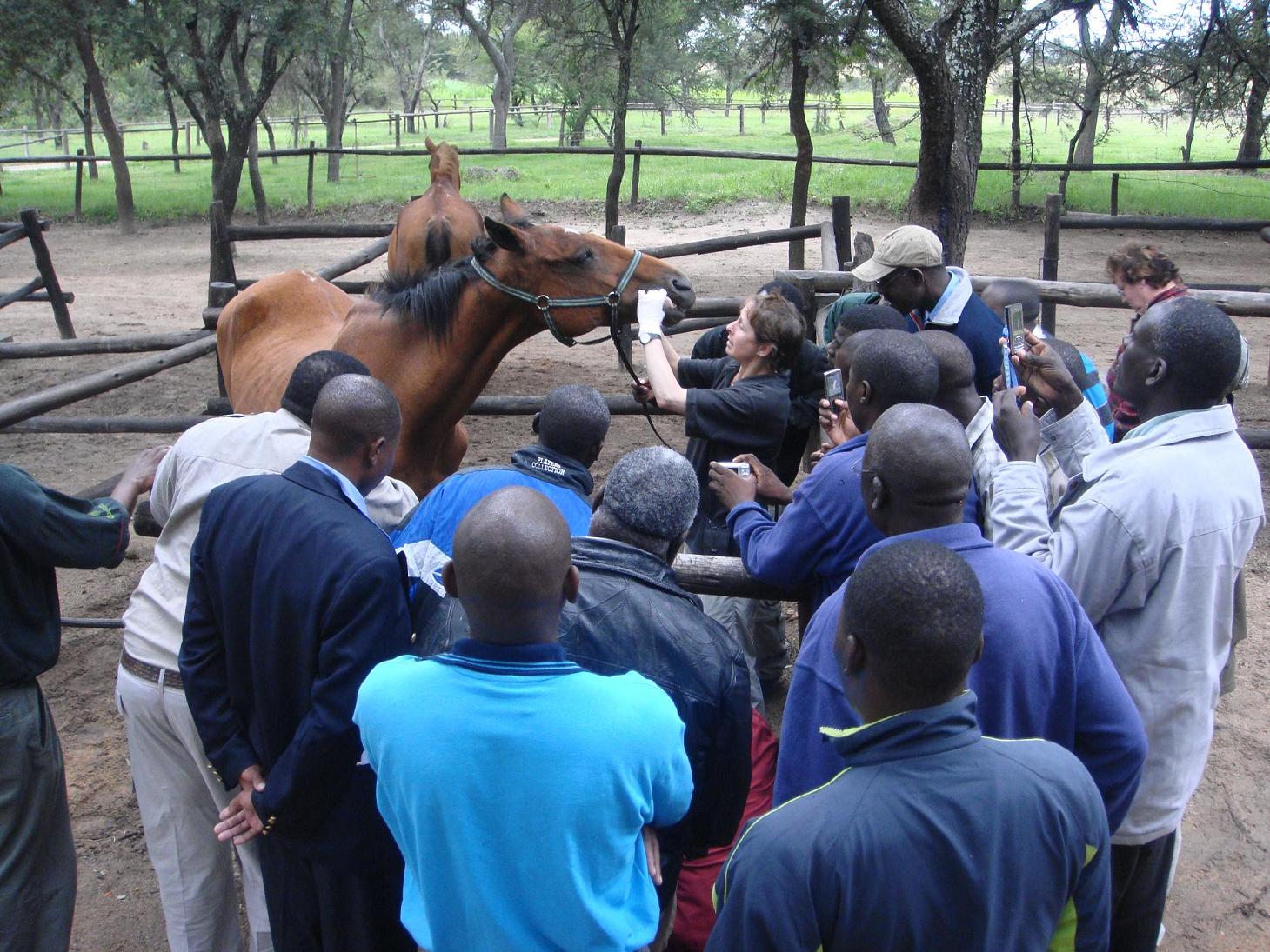
Early March 2010 saw Communications and Veterinary Directors of SPANA, Simon Pope and Dr Karen Reed, come out from the UK to take a course in donkey medicine and welfare that was organised by AWARE in Gweru. 23 vets and animal health inspectors practising in rural areas where many donkeys are encountered were invited to the course. This included inspectors from the SPCA countrywide. A day of lectures was followed by a donkey clinic where 40 donkeys were treated for a range of veterinary problems including some spectacular abscesses and the usual axe and spear wounds and lameness problems. The course was very well received and all participants learnt alot and went away much more confident in dealing with donkey issues. Read more in March 2010 newsletter.
Zimbabwean wildlife vets attend inaugural wildlife diagnostics course in Pretoria
Drs Marabini and Dutlow were sponsored by Wildlife Conservation Society (WCS), based in America, to attend the inaugural ‘Practical Wildlife Disease Investigation’ course at the University of Pretoria in April 2009. AWARE Trust in turn sponsored Dr Chris Foggin of the Wildlife Veterinary Unit to attend this course.
The course was aimed at standardising veterinary diagnostic procedures within Trans Frontier Conservation Areas in Southern Africa, and was given by eminent South African wildlife vets.

